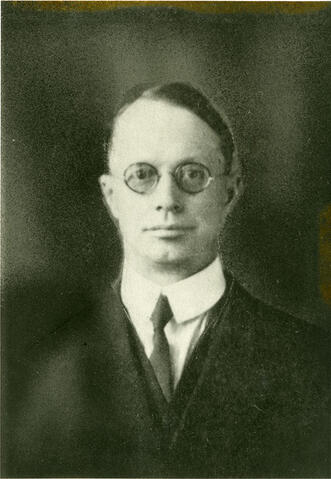
Title and statement of responsibility area
Titel
Dr. Samuel E. Greenway - Portrait
Algemene aanduiding van het materiaal
- Graphic material
Parallelle titel
Overige titelinformatie
Title statements of responsibility
Titel aantekeningen
Beschrijvingsniveau
Stuk
archiefbewaarplaats
referentie code
Editie
Editie
Edition statement of responsibility
Class of material specific details area
Statement of scale (cartographic)
Statement of projection (cartographic)
Statement of coordinates (cartographic)
Statement of scale (architectural)
Issuing jurisdiction and denomination (philatelic)
Datering archiefvorming
Datum(s)
-
[before 1919] (Vervaardig)
Fysieke beschrijving
Fysieke beschrijving
1 photograph : b&w ; 12.5 x 18 cm
Publisher's series area
Title proper of publisher's series
Parallel titles of publisher's series
Other title information of publisher's series
Statement of responsibility relating to publisher's series
Numbering within publisher's series
Note on publisher's series
Archivistische beschrijving
Naam van de archiefvormer
Geschiedenis beheer
Bereik en inhoud
Head and shoulders portrait of Dr. Samuel Earl Greenway, Director of Extension.
Bio/Historical Note: Dr. Samuel Earl Greenway was born 16 February 1875 in Little Prairie, Wisconsin. He settled in Manitoba in 1880, and was in turn a farmer, teacher, telegraph operator, and reporter, editor and contributor to magazines. Dr. Greenway was involved in a pivotal event in the history of the University of Saskatchewan, known as “the University crisis of 1919.” The matter became public on June 28 when the Saskatoon Star announced that four members of faculty had been fired without explanation. They were: Samuel E. Greenway, director of Extension; Robert D. McLaurin; head of Chemistry; Ira A. MacKay, professor of Law; and John L. Hogg, head of Physics. All were senior members of faculty with many years of experience. The affair had started in March of that year when Greenway had accused Walter C. Murray, University President, of falsifying a report about University finances. This complaint had been made to the government and not to the Board of Governors. In early April Council voted 27 to zero “affirming its confidence and loyalty to the President” while four members abstained. Three of those who abstained plus Greenway were dismissed as the Board put it, “in the best interest of the University.” The public and the press clamoured for an explanation. When one was not forthcoming, calls for a public inquiry were loud and persistent. In accordance with the University Act, the Lieutenant Governor assumed the role of Visitor and through the office of the King’s Bench held a series of hearings. The Visitor’s report was delivered in April 1920 and vindicated the Board’s decision saying it was “regular, proper and in the best interest of the university.” The professors were not protected by tenure but were employed “at the pleasure of the board.” Their act of disloyalty was enough to cost them their jobs.
Aantekeningen
Materiële staat
Directe bron van verwerving
Ordening
Taal van het materiaal
Schrift van het materiaal
Plaats van originelen
Beschikbaarheid in andere opslagformaten
Restrictions on access
Termen voor gebruik, reproductie en publicatie.
Photographer: Unknown
Copyright holder: Public domain
Other terms: Responsibility regarding questions of copyright that may arise in the use of any images is assumed by the researcher.

